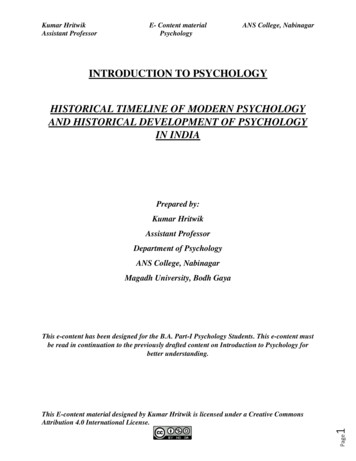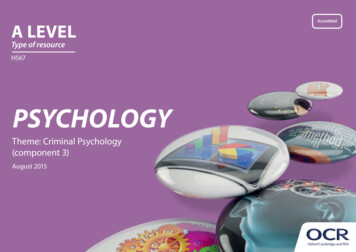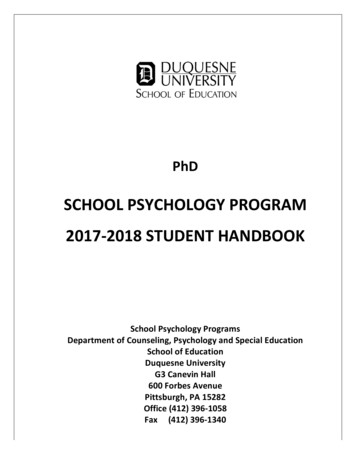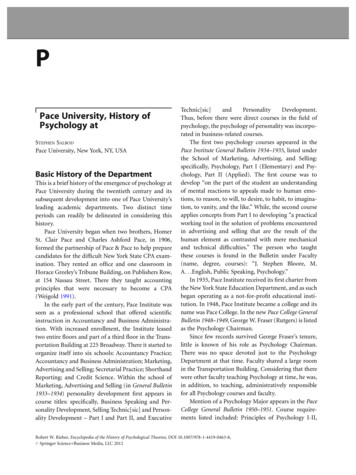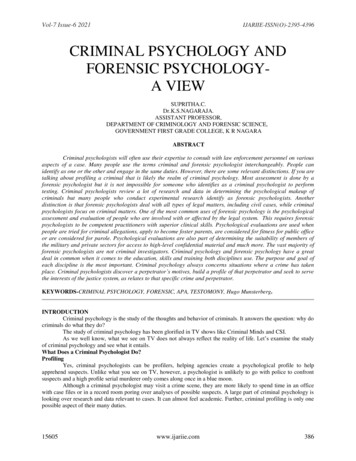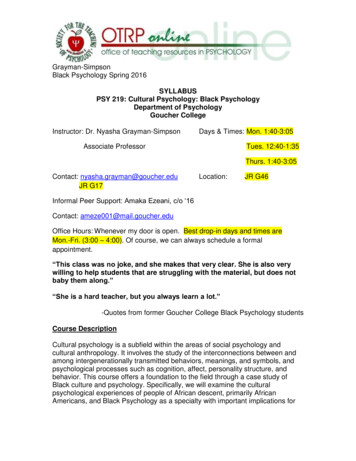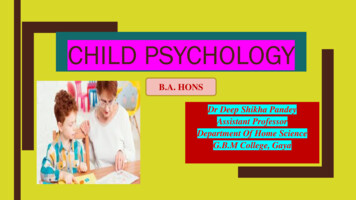
Transcription
CHILD PSYCHOLOGYB.A. HONSDr Deep Shikha PandeyAssistant ProfessorDepartment Of Home ScienceG.B.M College, Gaya
CONTENT1- INTRODUCTION32- DEFINITION213- SCOPE
MEANING Child psychology is the study ofsubconscious and conscious childhooddevelopment.Childpsychologistsobserve how a child interacts with theirparents, themselves, and the world, tounderstand their mental development. Jean Piaget is regarded as the founder ofmodern child psychology. His work, fromthe 1920s onwards, supported the idea thatchildren and adults think differently fromeach other. One of his major contributionswas that throughout the course of theirchildhood, children pass through distinctstages of emotional and mentaldevelopment. He also proposed thatintellectual development is closely linkedto emotional, social and physicaldevelopment.
Child psychology, alsocalled child development, the study ofthe psychological processes of children and,specifically, how these processes differ fromthose of adults, how they develop from birthto the end of adolescence, and how and whythey differ from one child to the next. Child Psychology is an important branch offamily health. It gives parents the resourcesto help their children advance through thestages of development and gives physicians adeeper look into the mental health andpossible challenges a child might face inregards to learning or social differences, ordevelopmental delays.
DEFINITION OF CHILD PSYCHOLOGYChild psychology is a scientific study of the individual from his prenatalbeginnings through the early stage of his adolescent development.- Crow and a Crow“Child psychology concerned with the development of the psychologicalprocesses in the child from birth and before, through infancy and childhoodto adolescence and maturity.”H.J. EysenckChild psychology is a branch of psychology which studies the human being indevelopment from birth to maturity.- James Draver
IMPORTANT OF CHILDPSYCHOLOGY Everyone wants their child to have healthy development,but it’s not always clear if a child’s behavior is a symptomof a normal stage in development or a sign of anabnormality. Child psychologists can help you Understanding the normal and abnormal psychologicalpatterns of a child can help parents understand how tobest communicate and connect with their child, teach theirchild coping mechanisms for managing emotions, andhelp their child progress and thrive in each newdevelopmental stage. Child psychologists can also identify abnormal behaviorsearly, help detect the root of common behavioral issuessuch as learning issues, hyperactivity, or anxiety, and helpchildren work through early childhood trauma. They canalso help to prevent, evaluate, and diagnosedevelopmental delays or abnormalities such as autism.
SCOPE OF CHILD PSYCHOLOGYPHYSICAL DEVELOPMENT Physical development in children is typically a predictable sequence ofevents. Your child holds their head up, rolls over, crawls, walks, and runs,in that order. Child Psychologist can aid your pediatrician in observingyour child’s physical development, and if there are any abnormalities thatcould indicate developmental irregularities. Child Psychologists will observe your child’s progression toward themilestones of development to ensure that your child is physicallydeveloping normally. Major delays in physical development may revealother underlying developmental issues that can then be addressed earlyon.
COGNITIVEDEVELOPMENT The medical understanding of childhood cognitive development hasgreatly changed over the recent years. We now know that even newbornbabies are aware of their environment and are interested in it, even beforethey have the language to express that. Cognitive development refers to the intellectual learning and thoughtprocesses of a child. It includes the observation and understanding of theworld around them, language learning, memory, decision-making,problem-solving, how the child uses their imagination, and how the childuses basic reasoning. All of these factors are influenced by a child’sgenetics and environment.
EMOTIONAL (SOCIAL)DEVELOPMENT Emotional and social development are deeply intertwined. Emotionaldevelopment refers to how the child feels, understands, and expressestheir emotions. Emotional development is expressed in very youngchildren through the expression of basic emotions like fear, joy, anger,and sadness. As the child develops, more complex emotions such asconfidence, hope, guilt, and pride emerge. Emotional development also includes a child’s ability to feel andunderstand the emotions of other people through empathy. Learning toregulate and express emotions appropriately is difficult for manychildren. Helping children understand their emotions early can have apowerful impact on current and future emotional development. A ChildPsychologist can help your child understand and express their emotions ina healthy, positive way.
Emotional development highly informs social development. This is truebecause the way a child feels understands, and expresses their feelingshas a direct impact on how they interact with other people. Socialdevelopment is about how the child develops the values, awareness, andsocial skills necessary to relate to the people around them; their parents,peers, authority figures, and animals. A child’s early relationships can have a huge impact on theirdevelopment of age-appropriate social skills. Trust, friendship, conflictmanagement, and respect for authority are examples of socialdevelopment. Child Psychology should not be a reactive measure. Makeit part of your proactive family health plan today.
IMPORTANCE OF CHILD PSYCHOLOGYCHILD PSYCHOLOGY IS A SPECIALISED BRANCH OFDEVELOPMENTAL PSYCHOLOGY. A child psychologist is an expert in childhood development who workswith children and adolescents to diagnose and help resolve issues thatcause emotional or behavioural problems. Child psychology is importantbecause it can help us better understand how kids tick as well as how bestto support them to become well rounded individuals. It is therefore usefulin assisting both parents and teachers to better understand and helpchildren in their care.
CHILD PSYCHOLOGY HELPS PARENTS AND TEACHERSBETTER UNDERSTAND KIDS AND HOW BEST TOSUPPORT THEM. Development Milestones Behaviour Emotions Socialization
1- DEVELOPMENT Three areas of Child Development:1. Physical development refers to physical body changes. These generallyoccurs in a relatively stable, predictable sequence. It also includes theacquisition of certain skills, such as gross-motor and fine-motorcoordination.2. Cognitive or intellectual development, refers to the processes childrenuse to gain knowledge. This includes language, thought, reasoning, andimagination.3. Social and emotional development are so interrelated that they are oftengrouped together. Learning to relate to others is part of a child’s socialdevelopment, while emotional development involves feelings and theexpression of feelings. Trust, fear, confidence, pride, friendship, andhumour are all part of one’s social-emotional development.
2-MILESTONES Developmental milestones are an important way for psychologists tomeasure a child’s progress in several key developmental areas. They actas checkpoints in a child’s development to determine what the averagechild is able to do at a particular age. Knowing the milestones fordifferent ages, helps child psychologists understand normal childdevelopment and aids in identifying potential problems with delayeddevelopment. For example, a child who is 12 months old can typically stand andsupport his or her weight by holding onto something. Some children atthis age can even walk. If a child reaches 18 months of age but stillcannot walk, it might indicate a problem that needs further investigation .
Physical milestones: Which pertain to thedevelopment of both the gross and fine motorskills. Cognitive or mental milestones: Which refer tothe child’s developmental aptitude for thinking,learning, and solving problems. Social and emotional milestones: Which pertainto the child’s ability to express emotion andrespond to social interaction. Communication and language milestones:Which involve the child developing verbal andnon-verbal communication skills.
3-BEHAVIOUR All children can be naughty, defiant and impulsive from time to time.Conflicts between parents and children are inevitable as the childrenstruggle, from the “terrible twos” through adolescence, to assert theirindependence and develop their own identities. These behaviours are anormal part of the growing-up process. However, some children have extremely difficult, with challengingbehaviours that are outside the norm for their age. In fact, behaviouralissues are the most common reason that parents seek the help of childpsychologists. Child psychology involves looking at all possible roots tobehavioural issues, including brain disorders, genetics, diet, familydynamics and stress, and then treating them accordingly.
4-EMOTIONS Emotional development involves learning what feelings and emotions are.Understanding how and why they happen, as well as recognizing one’s ownfeelings and those of others, then developing effective ways of managingthem. This complex process begins in infancy and continues into adulthood. Thefirst emotions that can be recognized in babies include joy, anger, sadness andfear. Later, as children begin to develop a sense of self, more complexemotions like shyness, surprise, elation, embarrassment, shame, guilt, prideand empathy emerge. The things that provoke emotional responses alsochange, as do the strategies used to manage them.
5-SOCIALISATION One of the first and most important relationships children experience iswith their parents or primary caregivers. The quality of this relationshiphas a significant effect on later social development. In peer relationships,children learn how to initiate and maintain social interactions with otherchildren. They acquire skills for managing conflict, such as turn-taking,compromise, and bargaining. Play also involves the mutual, sometimes complex, coordination of goals,actions, and understanding. Through these experiences, children developfriendships that provide additional sources of security and support tothose provided by their parents or primary caregivers .
REFRENCES https://www.google.com/search?type guardian&q meaning%20of%20child%20psychology y hild-psychology/ : :text tps://www.google.com/search?q scope of child psychology&sxsrf ource lnms&tbm isch&sa X&ved 2ahUKEwiyp5PL94brAhWb4zgGHWd-AUsQ AUoAXoECBAQAw&biw 1366&bih 625
Child psychology is a scientific study of the individual from his prenatal beginnings through the early stage of his adolescent development. - Crow and a Crow Child psychology is a branch of psychology which studies the human being in development from birth to maturity. - James Draver "Child psychology concerned with the development of the .
